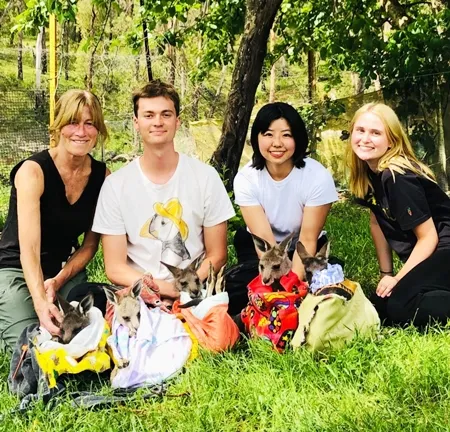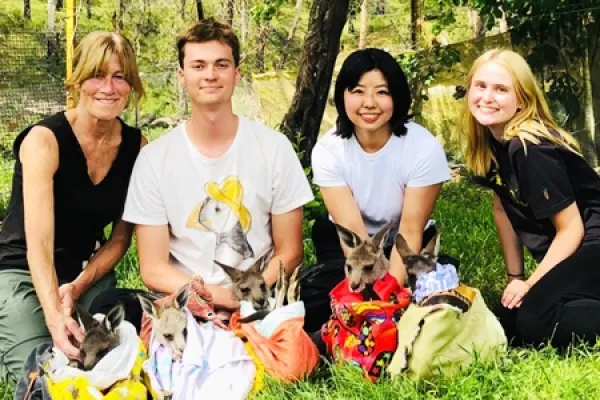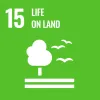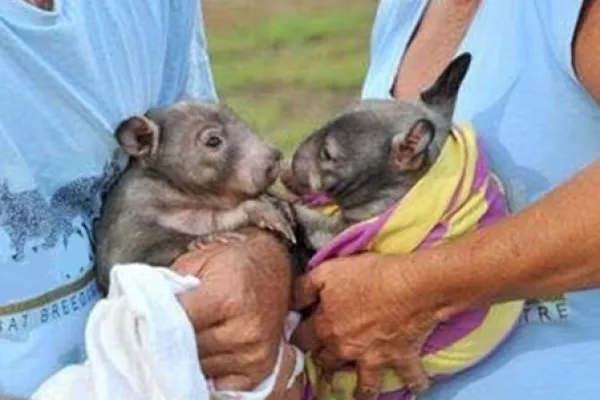Overview
Volunteer as a caregiver in a Wildlife Rescue Shelter in Australia with Volunteering Solutions to get a chance to work alongside beautiful Australian animals and get involved in animal feeding, cleaning, maintenance and other activities. The Project is located in a small town near Holbrook, NSW and is 95 km northeast of Albury and 507km southwest of Sydney.
For decades, the project has rescued and rehabilitated sick, injured and orphaned native Australian wildlife and nurtured them back to health to be returned to the natural environment.
While the number of native animals needing help is increasing, resources are not high enough. Your contribution is enormous as the feeding schedule of the animals, especially the nursery is a busy one and the shelter needs surrogate mums to provide food for the babies and care for them.
Volunteers who come to this project are given a unique opportunity to work alongside beautiful Australian animals and are involved in animal feeding, cleaning, maintenance and enrichment.
Since it receives no recurrent funding from governments, the shelter relies on the contribution of volunteers and donations from the public to keep it running. It has no paid staff and by volunteering at the project, you make a major contribution to the welfare of Australian wildlife. On a personal level, you have the satisfaction of helping to make a positive difference to the lives of these animals, and in the process, you may gain new skills and knowledge.
The objectives of the project are as follows :–
- To raise and care for injured and orphaned wildlife.
- Rehabilitate and release native animals back into their natural environment.
- Training carers & volunteers in the appropriate care of native Australian wildlife.
- Ensuring that we maintain the best standards of care.
- Raising public awareness of wildlife issues.
- Ensuring that the donations we receive are put to their most effective use in the rescue, rehabilitation and release of native Australian wildlife.
- Maintaining a 24 hr/day, 7 days/week phone service to receive reports on sick, injured or orphaned native Australian animals.
If you're an animal lover, then this would surely be a delightful choice for you! Not only will you get to work for a noble cause, but it'll be a great chance for you to meet people from different parts of the world and explore Australia like never before! This program would be the best choice for high school/ college students, backpackers and gap year travelers who are looking for some meaningful work abroad.
Volunteer Work Schedule
Volunteer Work Schedule
Care for the animals is required 365 days a year and the project operates a flexible seven day working week.
Volunteer Roles & Responsibilities
Volunteer Roles & Responsibilities
Volunteers play a key role in wildlife rescue and care. Not only will you be learning new skills and helping animals in need, you meet new
friends from around the world and create an enriching experience for yourself.
Volunteers must have enthusiasm, compassion for animals, be able to take directions and have a team spirit. No animal experience is
necessary, although representatives from relevant fields are more than welcome to contribute to the team.
Volunteer Duties & Daily Schedule generally include the following activities :-
- Bottle feeding all young animals
- Toileting young animals after feeds (please see the shelter owner if you are uncomfortable with this task as it must be done properly)
- Exercising young animals
- Assisting in rescue calls
- Assisting in emergency medical treatment
- Cleaning animal enclosures
- Building / repairing animal enclosures/fences
- Keeping the grounds clean and tidy
Project Requirement
Project Requirement
Volunteers must be 18 years or older at the time of joining the project. You need to have an open mind and a flexible attitude for working in a new and different environment. The volunteer should bring energy and enthusiasm to make a difference. Participants must be fit and healthy at the time of joining the program. Every volunteer is required to show proof of Tetanus vaccination prior to joining the program. The program is suitable for those with a keen interest in animal and wildlife conservation. However, the program is open to all and you do not need the necessary qualifications to join the program. Participants should be prepared to work outdoors and should be fit and healthy.
Schedule a Google Meet with a Program Advisor
Interested in our programs? We're here to provide expert guidance
- Get Detailed Info
- 20 min One -on-One meeting
- Get expert advise
- Application Guidance
Photo Gallery
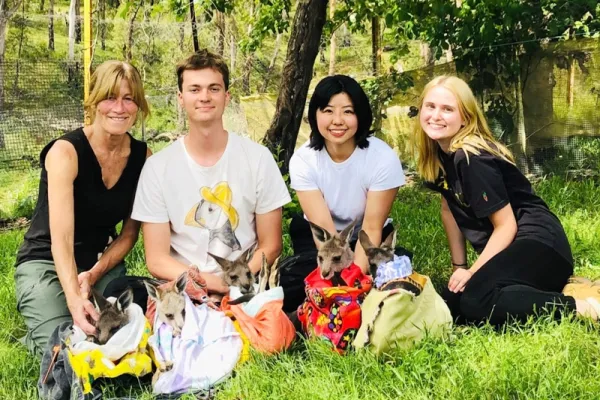
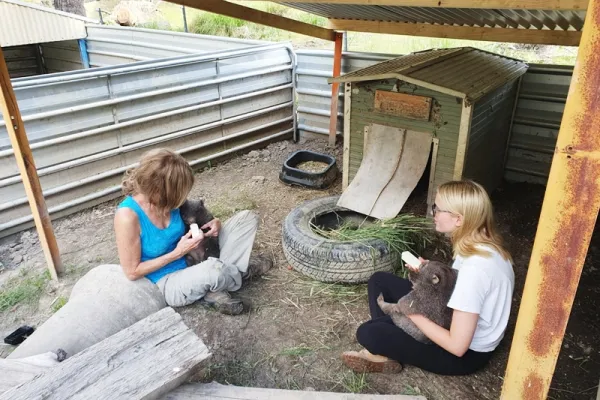
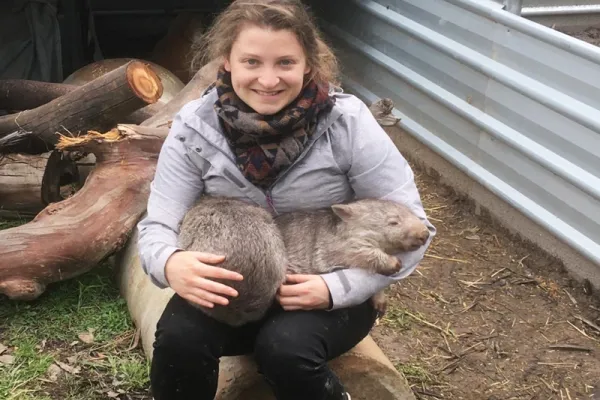
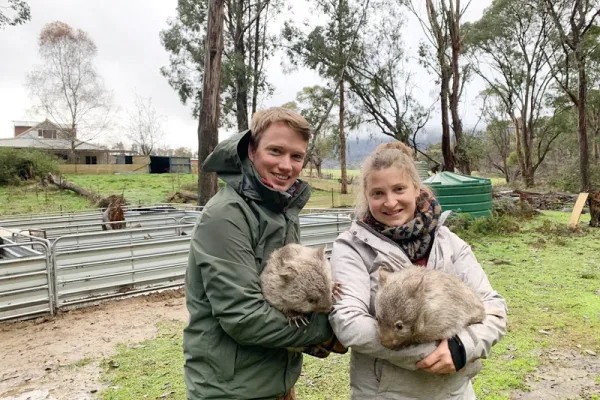
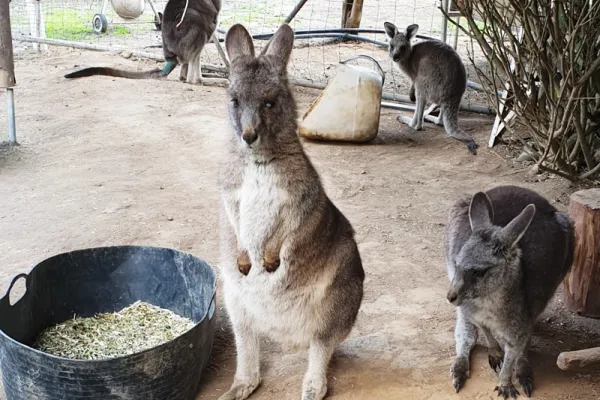
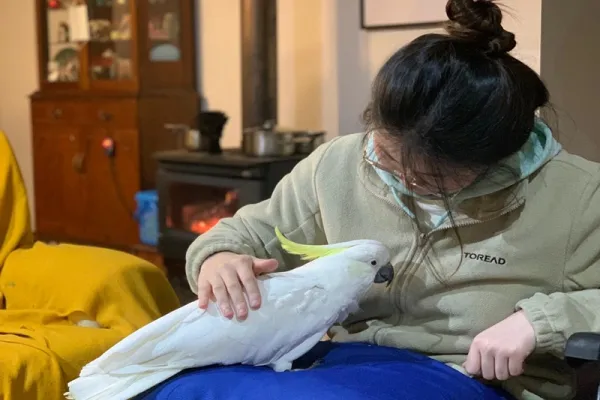
Living
Living
Airport Transfer
Volunteers need to fly into Sydney to reach Albury in NSW. You can take a flight from Sydney to Albury Airport (code ABX) where you will be picked up by the project staff. Alternatively you can take a bus to Albury or Wagga Wagga from Sydney or Melbourne and will be picked up by the team. Please note that pickup from Albury airport is only provided between 9am - 4pm.
Orientation
Volunteers are picked up by a staff member at Albury and transferred to the project. Once you arrive, you are shown to your room and given a brief induction regarding first aid, safety, toilets, showers, laundry, generator power and work duties. You are given instructions on how to behave around the wild animals that wander around the shelter. Depending upon when you arrive and how busy the shelter is at the time, you may have some time to settle in, relax and acclimatise or you may be thrust into work straight away. Make yourself at home and it becomes familiar very quickly.
Please note : Do not handle the animals unless you are asked to and shown how to.
The first week involves lots of on the job training as each volunteer learns the different tasks involved in caring for the animals and the different jobs that need to be carried out to support the animals and the maintenance of the project. There is always something to do so feel free to use your initiative and suggest a new project you are interested in. You are briefed by the carers however other volunteers can assist and you quickly learn the routine. As the carers work other jobs, you may be left to care for the animals during the day unsupervised. This is an opportunity to utilize and strengthen your leadership skills.
Accommodation
Accommodation is a homestay in the carer’s house. There are two rooms, so depending upon how many volunteers are there at a time, you may find yourself with your own room. There is plenty of space for your personal belongings and your bags. Please ensure that your cameras and phones are charged overnight so you have them available to take some snaps during the day while you are working.
There is a toilet and shower on site. The water comes from a rainwater tank, however due to continuous drought seasons in Australia,
rainwater is a scarce commodity, and you may not be able to shower every day. When showering, volunteers are asked to keep
showers short.
Meals
Volunteers are provided three meals a day, morning tea, drinking water, tea, coffee and sugar. Volunteers are responsible for buying any additional items they would like to purchase from the local town. The cooking is usually shared. Everyone welcomes a new chef !
Volunteers are asked to assist with the shopping and take part in the meal planning and/or preparation to ensure that their dietary needs are catered for.
Domestic duties are shared by all the volunteers including meal preparation, washing and tidying up.
During Free Time
During free time volunteers get involved in popular pas times such as taking photographs, reading, blogging and spending time with the animals. Volunteers are not always given an opportunity to visit the local town, however, there are outings and sightseeing opportunities scheduled only if the shelter is quiet. Please note that not all volunteers get the opportunity to go on outings and the expectation is that they will work a 7 day work week.
Dates
Dates
January
08
15
22
29
February
05
12
19
26
March
05
12
19
26
April
02
09
16
23
30
May
07
14
21
28
June
04
11
18
25
July
02
09
16
23
30
August
06
13
20
27
September
03
10
17
24
October
01
08
15
22
29
November
05
12
19
26
December
03
10
17
24
31
Available
Filling Fast
Booked Out
Costs
| Duration |
Program Fee
|
Choose your currency
|
|---|---|---|
| 1 Week | $583 | |
| 2 Weeks | $1156 | |
| 3 Weeks | $1734 | |
| 4 Weeks | $2210 |
Please Note: An application fee of is charged over and above the program fee as an application payment. A 5% international banking fee is charged for credit card payments of program fee in USD/AUD.
Inclusions
Not Included
- Flights
- Return transfers to airport
- Travel Insurance
- Personal Spending
- Visas
FAQ's
Application and Program Details
-
Can I volunteer as part of a group?
-
We encourage our participants to volunteer in a group. We take special care in providing you a placement and also customize your itinerary to make sure you get exactly what you are looking for. Also, we can design special group programs for groups of 5 or more. Our programs are designed to be safe, affordable and offer a great group volunteering experience to the volunteers.
In our experience of more than 12+ years, we have enabled and facilitated volunteer program placements for student groups- college groups, university groups, high school groups, group of families, group of couples as well as a group of colleagues.
Visit https://www.volunteeringsolutions.com/group-volunteer-abroad"; target="_blank">Group Volunteering page for more information. -
Does Vol Sol provides a reference or a certificate after program completion?
-
Yes, we will provide you with the Certificate after successful completion of your program. The certificate is provided on request.
-
When should I apply for the conservation volunteer program in Australia?
-
As we have limited spots available in our programs and we facilitate on ‘first come first serve’ basis, it is recommended that potential volunteers book their programs well in advance to get confirmed placements. You can book your slot by filling out the application form online and pay the application fee of $250 + bank charges. You can pay your program fee later and also, in installments, however, the complete payment should be made 45 days prior to the starting date of the program. If you are volunteering in a group, you can also fill a group application form.
-
What are the Program locations in Australia?
-
Volunteering Solutions provides placement to volunteers in different cities of Australia. The preference of the city should be specified in the application form. The available program locations are:
- Cairns
- Rural Gladstone
- Yackandandah
-
Does Vol Sol provides discount if I choose more than one program or if I am a returning Volunteer?
-
If you are planning to come for multiple programs in your trip, you will have to pay the application fees just once. Your application fees is valid for a year's time (from the date of application). You will not have to pay the application fees again if you come within the mentioned time frame. If you decide to volunteer in separate programs in multiple countries, you will need to fill separate applications.
-
How long does it take to process my application? Will my application be accepted?
-
After you complete your application, your personalized ‘My Account’ will be activated. You will need to upload your CV/Resume along with your photo in the same. Our backend team and the placement site takes around 10-12 days to review your application. After we review your CV and documents, your booking is confirmed and booking confirmation is updated in your ‘My Account’. Some projects need a mandatory criminal background check and the same is mentioned in the project info of your program. Approval of your application depends on your qualification and eligibility criteria for each project.
-
Can I volunteer in more than one starting location within Australia ?
-
Yes – many volunteers choose to make bookings from two or more starting locations. If you choose this option, you’ll need to arrange and pay for your own travel between starting locations. You should either leave a week in between your bookings, or arrange to rejoin at your new starting location on Monday morning as we cannot accommodate volunteers arriving on weekends.
-
Will I be in contact with animals?
-
The amount of contact volunteers have with the animals is dependent upon the project. Some are very hands on and others have limited contact.
-
Are there any necessary requirements to participate in the Australian volunteer programs?
-
Are there any necessary requirements to participate in the Australian volunteer programs?
Below are the necessary requirements to participate in the Australian volunteer projects :
– The minimum age requirement for the volunteers is 18 years and above.
– Need to have an open mind and flexible attitude for working in a new and different environment.
– The volunteer should bring energy and enthusiasm to make a difference.
– Participant must be in good health. -
When do I need to arrive in Australia for my program? What will happen once I arrive in Australia?
-
All volunteers are required to arrive at the nearest airports at their preferred location in Adelaide, Brisbane, Cairns, Canberra, Darwin, Melbourne, Perth, Sydney. The Australian programs are located near Melbourne, Sydney, Gladstone and Cairns Airports.
Health and Safety
-
How safe is Australia?
-
Australia is a tourist friendly destination. The country welcomes you with open arms. However, you have to use your prudence to stay out of the harm’s way. For example, stay in a group or with the fellow volunteers, especially when you want to hit the bar or go grab a drink. Inform your coordinator if you have plans to explore the city alone, keep your emergency contact details always with you. Your pre-departure booklet is a good source of information for you and you must read that diligently.
-
What immunizations/vaccinations will I need?
-
We recommend you consult your physician or travel doctor before travelling to Australia.
Generally the following vaccinations are recommended for travellers going to Australia :
– Yellow Fever (Required if travelling from a YFV infected country)
– Hepatitis A and B
– Typhoid -
Do I need to buy a health insurance?
-
Yes, for all participants it is mandatory to have a travel medical insurance.Volunteers have the option to purchase Travel and Medical Insurance at a nominal extra cost from Volunteering Solutions. To provide the best option to our participants, we offer comprehensive insurance coverage in collaboration with a leading insurance provider.
Accommodation and Living
-
Can I know more about the accommodation and food arrangements?
-
Accommodation will vary according to each project location. Typical accommodation includes volunteer houses, caravans, hostels, and bunkhouses. Volunteers are allotted accommodation on a sharing basis.
-
For how many hours do I have to volunteer in a day?
-
Volunteers work for 3 to 8 hours a day depending on their program. However, volunteers need to be flexible, open-minded and understand that work requirements can change as well on certain occasions.
-
Can vegetarians and vegans be accommodated?
-
Yes, however you must inform us in advance and also mention about any dietary requirement in your application form.
-
Are there more expenses once I arrive in Australia?
-
Your program fee covers your Accommodation, Food and In country Support. You will need to cover your personal expenses, such as local transport, telephone, internet, shopping, weekend trips etc.
However, you should carry around $70-80 per week for your basic personal expenses. This amount can vary and you would need a higher amount if you go on weekend sightseeing tours. -
How do I get to the accommodation and the program location?
-
You will need to make your own way to the office which is your starting point. All our offices are at central locations, and we will provide directions to help you get there.
You need to plan accordingly, in order to arrive at the office by 11am on Friday morning, and be ready to start your program.
A member of the in-country coordinating team will take you to your placement and introduce you to your project after giving you a basic orientation about the program/city/culture etc.
You will be briefed about the directions to the project from your accommodation and the mode of transport as well. -
Where can I change my money in Australia? Are there ATMs in Australia?
-
Plenty of money exchange counters and ATMs are available in Australia. at the airport as well in most Australian cities.
Connect with Past Volunteers
-
How can I connect with past Volunteering Solutions Australia alumni and other former and current volunteers?
-
We encourage volunteers to get in touch with former Volunteering Solutions Australia program participants and also other program participants joining our projects. You are recommended to join the Volunteering">https://www.facebook.com/VolunteeringSolutions/">Volunteering Solutions Facebook Page or Facebook">https://www.facebook.com/groups/volunteeringsolutions/">Facebook Group to connect with other participants.
To read alumni interviews from past participants, visit the Meet">https://www.volunteeringsolutions.com/meet-a-volunteer">Meet a Volunteer section on our website.
Flights and Visa
-
Do I need a Visa to go to Australia?
-
Volunteers traveling to Australia need to have a valid visa. We provide with the necessary supporting documents for your VISA application processing.
More information shall be provided after you become a Volunteering Solutions enrolled participant. -
What are the recommended airlines to fly to Australia ?
-
All the major cities in Australia have connectivity with all major airlines around the world. The recommended airlines are :
QANTAS Airways
British Airways
Thai Airways
Emirates
Malaysian Airlines
Singapore Airlines
Air Asia


























